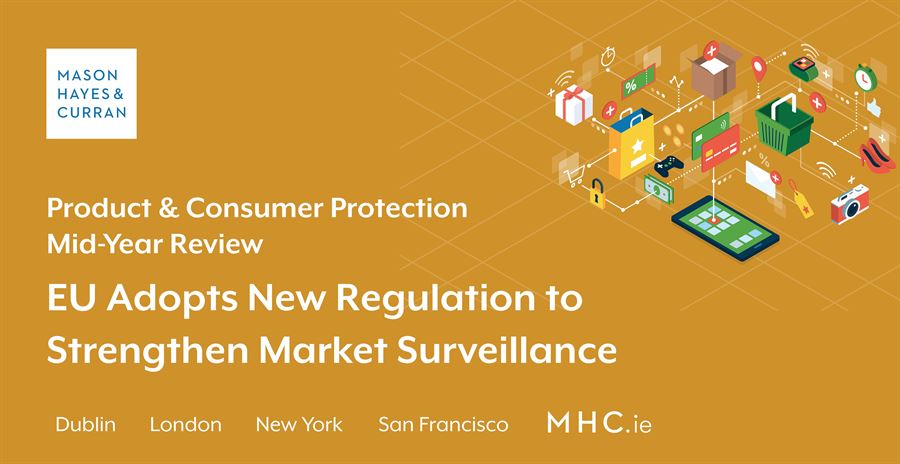EU Adopts New Regulation to Strengthen Market Surveillance

The EU’s new Regulation on market surveillance and compliance of products (the Regulation) seeks to improve market surveillance of specific products covered by EU harmonisation legislation. If specific market surveillance rules are currently in force for a particular product that the Regulation also deals with, then these rules will still apply.
In addition, products imported into the EU will also be governed by the Regulation. Examples of products and chemicals covered include: medical devices, machinery, batteries, toys, fertilisers, detergents and cosmetics, amongst many others.
The role of the economic operator
One of the most significant elements of the Regulation is the role attributed to ‘economic operators’. The Regulation prohibits a number of products to be placed on the market unless an economic operator established in the EU is identified.
The economic operator must ensure the availability of the product’s technical and conformity documentation. They are also responsible for cooperating with market surveillance authorities in cases of non-compliance and informing authorities when they believe a product presents a risk. For the purposes of the Regulation, an economic operator can be:
- the manufacturer
- the importer, in instances where the manufacturer is not established in the EU
- an authorised representative who has a written mandate from the manufacturer, or
- a fulfilment service provider, when none of the above are established in the EU. A fulfilment service provider is a person or company offering at least two of the following services: warehousing, packaging, addressing and dispatching, without having ownership of the products involved. Postal and parcel delivery companies are specifically excluded.
Know your obligations
The Regulation sets out a specific obligation for all economic operators of cooperation with market surveillance authorities. Companies placing relevant products on the EU market, who have not yet identified a responsible person established in the EU or who have an economic operator in the United Kingdom, should consider their obligations and take steps now to ensure compliance with the Regulation.
This requirement will also impact e-commerce businesses in particular as it requires non-EU suppliers who ship directly to end users in the EU to establish a representative in the EU, and makes the fulfilment service provider responsible when there is no such representative.
Enhanced powers for market surveillance authorities
The Regulation obliges Member States to designate one or more market surveillance authorities in its territory and enhances the authorities’ powers to ensure an effective level of market surveillance for products sold offline and online. Market surveillance authorities must ensure that economic operators take corrective action when instructed and the authorities must act when they fail to do so. They must also conduct appropriate checks of products, including physical and laboratory checks, where appropriate.
Their powers under the Regulation include the following, amongst others:
- the power to require economic operators to provide relevant documents such as technical specifications and data or information on compliance
- the power to carry out unannounced on-site inspections and physical checks of products
- the power to enter any premises that the economic operator uses
- the power to require economic operators to take the appropriate corrective action in the event of non-compliance, including the power to prohibit the making available of a product on the market and the power to order that the product be withdrawn or recalled
- the power to impose penalties
- the power to acquire samples
- the power to remove content from, or restrict access to, an online interface
Manufacturers should be aware that products deemed non-compliant by a market surveillance authority in one Member State will be presumed to be non-compliant in other Member States unless a relevant market surveillance authority in another Member State concluded the contrary on the basis of its own investigation.
Specific rules for imported products
The Regulation also introduces specific rules which apply to imported products. EU countries must designate authorities with powers to check imports and market surveillance authorities must provide them with information on products and economic operators where a high risk of non-compliance has been identified.
Conclusion
The implications of the Regulation will not become fully clear until July 2021. Economic operators placing products and chemicals subject to the Regulation on the EU market, including distance sellers, should take action now to understand and prepare for the impact of this Regulation. In particular, an EU-based economic operator should be lined up now to take responsibility.
In terms of the impact of Brexit, UK companies will need to consider the appointment of an economic operator in the EU once the transition period comes to an end.
For more information and expert guidance in navigating these challenging issues, contact a member of our Product Regulatory & Liability team.
The content of this article is provided for information purposes only and does not constitute legal or other advice.
Share this:




